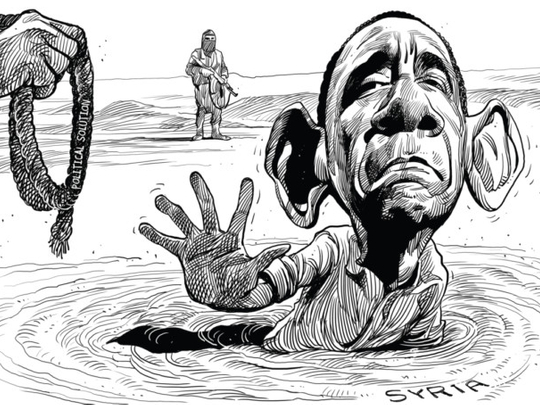
The leading powers in the West and several Arab states are preparing to intervene in the Syrian civil war, despite refusing to get involved for more than three years. Regrettably, this major change in strategy has nothing to do with Syria and nothing to do with the mounting death toll (more than 200,000) and refugees (more than eight million in one of the world’s largest-ever humanitarian disasters). It has everything to do with the new American priority of degrading and destroying Daesh (Islamic State of Iraq and the Levant).
The sudden success of Daesh in Iraq accompanied by its terrible acts of barbarity forced the US to react to support the Iraqi government with its Arab and other partners in the new coalition. But it is clear that Daesh is not just an Iraqi problem and if it is to be extirpated, action has to be undertaken in both Iraq and Syria. “[Daesh] has forced the US to take previously unthinkable steps in Syria,” said Fredric Hof, the former US ambassador who had worked with US Special Envoy George Mitchell for many years, speaking this week at the inaugural Abu Dhabi Strategic Debate. The rapid change in US priorities has been backed by many in the Arab world like the UAE, Saudi Arabia and Egypt, who see extremists as the principal danger for stable governance in the region, while other allies like Turkey remain very cautious of getting sucked into the Syrian civil war and are not willing to embrace the sudden American priority of removing Daesh.
Hof outlined several priorities in the rapidly evolving US policy on Syria. First, he pointed out that the US still backs the June 30, 2012, communique from the last United Nations conference on Syria, which says that there is no military solution in Syria and President Bashar Al Assad has lost all legitimacy to continue to govern. To achieve this political goal, there have to be ground forces in Syria, which cannot be US forces and therefore must be Syrian. This requires the US to back the secular Syrian opposition, however chaotic it may be at the moment, and Hof pointed out that there is a $500 million (Dh1.83 billion) package approved by Congress to train and equip an opposition force of up to 5,000 fighters.
“This is no where near enough,” said Hof, who is now a senior fellow at the Atlantic Council. He added that he understood that the US administration was looking at a much larger commitment to revive the fragmented nationalist opposition and support a secular alternative to both Al Assad and the dangerous Islamist extremists who have profited so much from the chaos of the Syrian civil war. This means that in the very short term, there has to be a special effort to re-arm the opposition quickly (as events in Kobani showed) and the money to support that may have to be taken from the medium-term $500 million package, which will then need to be topped up and expanded.
Then if the opposition is to make any headway and establish any kind of civilian administration, it will need a protected zone, which means the regime air forces need to be grounded. Growing support for this route was indicated by Hof who quoted US President Barack Obama as speaking of the administration’s support for opposition governance inside Syria, which, therefore, requires a protected zone in order to happen.
Hof’s analysis of growing US involvement in Syria was noted by Najeeb Gadbian, special representative to the United Nations of the opposition Syrian National Coalition, who was clear that a safe zone had to be created and that air strikes were simply not sufficient to win the war against Daesh in Syria (or Iraq), as well as the Al Assad regime. Gadbian added that a military balance had to be created between the secular opposition and the regime so that talks can start between the two parties who will have a joint interest in ending the war and a negotiated way forward can be defined. He was clear that Al Assad cannot be part of the solution, but that many parts of the regime will have to be. “We saw what happened in Iraq and Libya and we do not want to destroy all the former institutions. Our country will need governance and institutions have to be nurtured.”
There is an obvious disconnect between the declared aims of the US administration and the disorganised secular Syrian opposition. America’s new priorities are to destroy Daesh and the administration has not said that it is interested in nation-building in Syria. The Syrian opposition is anxious to take advantage of the new Obama focus on Syria while it can, but it just has to hope that the administration will take a longer view and recognise that unless it takes part in nation-building and supporting the secular opposition, Syria is likely to remain a base for dangerous extremists for the foreseeable future.
What all parties to the current coalition against Daesh have to remember is that the potential military success is only a stepping stone to rebuild civil governance. Whether that is in a divided Syria or Iraq or in rebuilt nation-states has to be decided by the Syrian and Iraqi people, to ensure a lasting solution.











